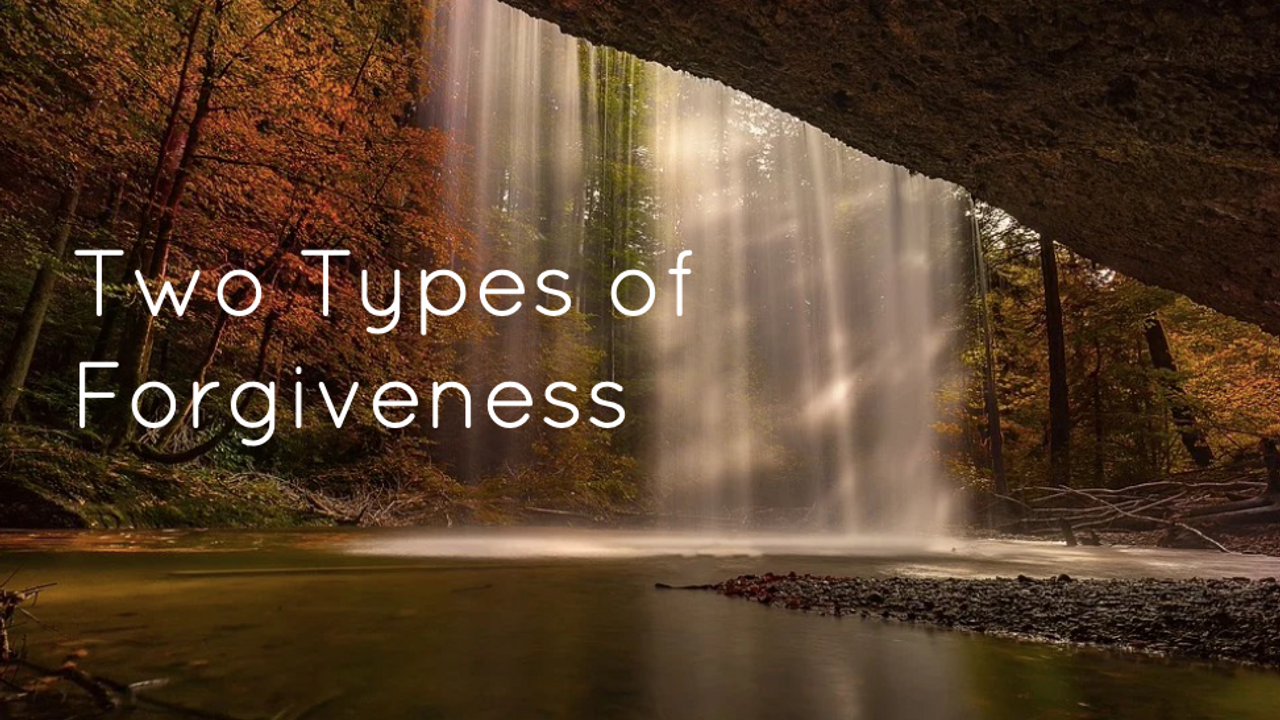Two Types of Forgiveness

Last week, we talked about the three different levels of apology. It is only fitting that this week we talk about forgiveness.
Forgiveness is hard, there’s no doubt about it. The way I see it, there are two different kinds of forgiveness: the hard kind, and the harder kind.
Let’s talk about the hard kind first. This first type of forgiveness is the least mature type and by far the most common. This type of forgiveness is based on conditions - conditional love, conditional acceptance, and conditional relationship. Let’s call this type Conditional Forgiveness.
Conditional Forgiveness shows up when you have a list of conditions that someone doesn’t meet. When you have a list of requirements and someone falls short. When you have a standard to be met and someone doesn’t meet it. When you have a box and someone doesn’t fit in it.
Think about someone who needs your forgiveness. Why do you feel they need your forgiveness? What condition of yours did they not meet? What standard of yours did they not reach? What box of yours did they not fall into? What expectations of yours weren’t met?
That is Conditional Forgiveness, when you say, “Well, you did something that is outside of my box for you. You did something that didn’t meet my conditions. I guess I’ll try to move past it, if - and only if - you try to fit back into my box.”
Here’s an example. I was speaking recently with someone about his mother. He was saying that he was having trouble being around her because she was a bad mother.
I asked what he meant by her being a bad mother.
He said that he thought she was a disciplinarian on one hand, and neglectful on the other hand. She was selfish, and never really connected with her kids.
He was trying to forgive her, but couldn’t.
Because he was using Conditional Forgiveness.
You see, this man unconsciously had a list of conditions for his mother. He had a standard that he expected her to meet. He had a box that he expected her to fit into. And she wasn’t.
He was having trouble forgiving her because he couldn’t make her fit into his box.
The second type for forgiveness is where we let go of the box completely, where we let go of the list of conditions, the expectations, and the standards.
This is Unconditional Forgiveness.
Unconditional Forgiveness is the harder kind, the more mature kind, and the rare kind.
It’s where we have no expectations for someone/ourselves/our life to meet and so we can let things go because we weren’t holding onto them in the first place.
In our example with the man and his mother, we discussed Unconditional forgiveness - dropping the box, the list of expectations for his mother completely.
Suddenly, his perspective was able to widen and his heart was able to open. He recognized that she had a rough upbringing herself. He saw that she was a young mother, and it was her first time bumbling through life, just like the rest of us. He was able to empathize, have compassion, and let go. Because there was nothing to hold onto.
We can drop the list of expectations for others. We can let go of what conditions we think others in our life - parent, spouse, children, coworkers, etc - should meet.
We can let go of the conditions and standards that we hold for ourselves.
We can let go of the expectations that we have for the way life should go.
Right now, you might be imagining life without lists, conditions, and expectations. You might be thinking in horror, “Well Elaine, doesn’t this mean that there’ll be affairs, crimes, drugs, laziness, gluttony, and all other sins and terrible things?!”
Maybe. Maybe not. So far, placing conditions and expectations on yourself and others hasn’t prevented sin and bad things. But the conditions and expectations sure have prevented healing after those things.
Further, if your conditions and expectations on your spouse are the only things keeping him/her faithful, you’ve got problems well beyond the scope of this article. If your expectations and conditions are the only things keeping your children in line, you haven’t taught them how to think for themselves. If your conditions and expectations are the only things keeping your coworkers from being lazy, then they really shouldn’t be at that job.
Your conditions and expectations don’t prevent chaos. They prevent healing.
Unconditional living on the other hand is being faithful that there is good in everyone, trusting that love wins, knowing that the world will keep turning and the Creator will keep loving. Unconditional relationships allow others to express - not repress - themselves as the image of their creator; it rolls with life’s twists and turns; it dances to the music of life.
For whom do you have a set of conditions?
Where do you have a list of expectations for yourself?
What standards do you expect your life to meet?
Here’s to Conquering Stress.
PS. Money issues constantly weighing on your mind? Find "Freedom from Financial Stress" with the online mini-course. It's not about making money, saving money, or investing money...it is so much more! Learn more here.
With heart,
The Stress Experts
Practical Strategies to Deal With Daily Stressors
Sign up to receive inspiration, skills, tools, and tough love right in your inbox each week. Don't worry, we won't share your email address and we're not going to fill up your inbox with junk.
